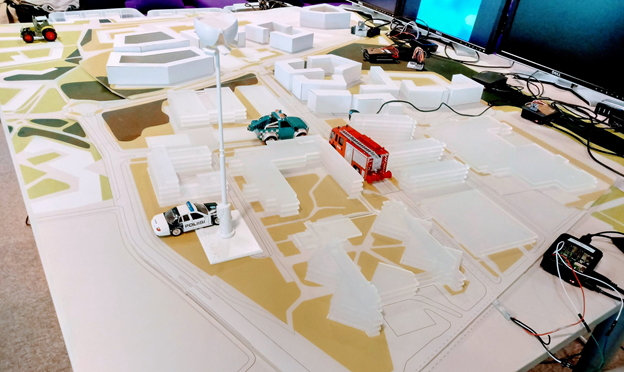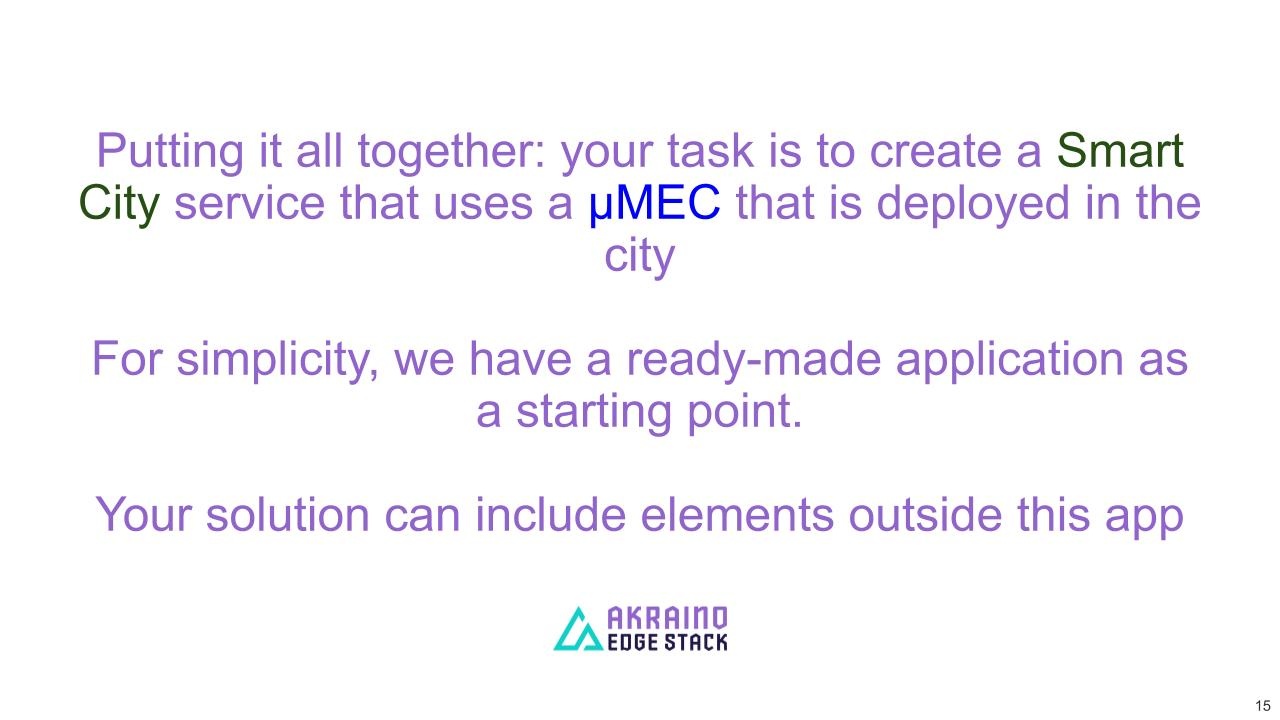Please provide an RSVP here for the event.
Register at: http://www.cvent.com/d/shq97f/4W
(If you have registered at the old link before, you need to register again at this cvent link which doesn't need LF account.)
Akraino 5G MEC Hackathon - Terms & Conditions (for reference) - included in registration path above
Summary
LF Edge and Akraino are teaming up with ETSI MEC (Muli-access Edge Computing) for a combined hackathon focused on 5G, happening ahead of KubeCon + CloudNativeCon North America on November 18 in San Diego, CA.
Venue Host: Qualcomm
Sponsors: Arm, ETSI, Futurewei and MobiledgeX
The applications in some of the blueprints/solutions will run as Docker containers with support from container run-time. Running platform software as Docker containers allows to upgrade them and allows to use a common management system.
Narrative:
https://docs.google.com/presentation/d/1N2w8kqChOl0fTSBbTWFAxhhLTkqK1pYl5cOxVkEi9iw/edit?usp=sharing
Blueprint/Solution 1:
MobiledgeX will participate provide the platform to run on top the MEC platform and device for people to hack. Mobiledgex APIs and API sub committee work is focused on open source driven approach.
Micro-MEC is a low-power, low-cost server at the edge of the network that supports Smart City use cases with different sensors (including cameras), is connected to Internet and telco networks, and allows third-party developers to create ETSI MEC applications to it.
So the Micro-MEC focuses on Smart City use cases. If you had different smart sensors in a city, collecting data that is available for free, what could you make possible? That was the challenge that we gave in a developer hackathon in May. We used the Akraino Micro-MEC platform and created a model city. Different sensors collected information and made it available through a database.
For the next hackathon, we want to make it very easy for developers to create applications that run on the Micro-MEC device itself. For this, we are implementing ETSI MEC compliant interfaces and leverage the OpenFAAS serverless platform.
The Micro-MEC platform that we are developing in Akraino will have a trusted computing stack, from trusted hardware to secure networking and signed containers.
The following blueprint/solutions are for technical discussion for the potential blueprints, not attending the Hackathon for the prize.
Blueprint/Solution 2: AR/VR
Low-latency AR/VR is a compelling use case for edge compute. Experience 5G-based multi-node client-server model for AR/VR and create new use cases for the capability.
There are 3 nodes, two of them have GPU. Only the two which have process graphics algorithm workload need GPU. The other node is for handling requests.
For the workload, the workload will be 3 containers, one redis container, one cockroach DB, and one object detection container.
One node: Ubuntu 18.04 is preferred
Two nodes: Windows
Blueprint/Solution 3: 5G MEC edge stack accelerated with SmartNICs
- Demonstrate SmartNIC accelerated Edge stack
- OVN-K8s in host and OVS offloaded in SmartNIC
- Software ecosystem support for SmartNIC platform
- Kubernetes support for networking acceleration and SmartNIC
Blueprint/Solution 4: 5G IoT
- IIoT integrating Fledge:
2. 5G IoT device
3. Cyber-physical systems
...
Blueprint/Solution N: ...
...
Hosted by Qualcomm.
You provide ideas and enthusiasm.
- We provide training with our existing MEC on related technology areas
- We provide office hours so participants can conduct mini whiteboarding sessions to flesh out their ideas around our technology
- We point them to relevant code samples, tutorials, FAQs, Journeys, Videos etc.
- We provide real time support for our technology to participants
- We continue to support finalist teams with continuous tech support after the hackathon
Meeting Agenda Lead: Tina Tsou, Akraino TSC Co-Chair
Please submit any questions about this event to tsc@lists.akraino.org, Alex Reznik
Dates and Locations:
Bldg S-210 on main Qualcomm campus at 5775 Morehouse Drive, San Diego, CA 92121.
- Breakout venue: Columbia University East Campus H306
Note: The Zoom meeting sessions will be recorded and posted to this event page.
- Qualcomm Hosted Continental Breakfast - 8:45am
- Meeting Start - 9am
- Qualcomm Hosted Lunch - 12:00 to 1:00 pm
- Qualcomm Hosted Coffee Breaks – 10:30am to 10:45am, 3:30am to 3:45pm
- Meeting End - 5pm
Please provide an RSVP (in person, via Zoom, or not attending) here for the event by 11 Nov 2019. This is very important for logistics and planning purposes. (Alex ReznikCan you confirm if a Zoom dial-in line will be needed for the Hackathon? Yes.)
Visa Letter Request Process: https://events.linuxfoundation.org/visa-request/
Recommended Airport: San Diego International Airport (SAN)
Distance from Airport: ~17 miles; 30 min drive.
Recommended Area Hotel(s): if wanting to stay near Qualcomm; ask for Qualcomm rate when booking stay
- Hyatt House San Diego/Sorrento Mesa
- Country Inn & Suites by Radisson - San Diego North
- Holiday Inn Express & Suites San Diego/Sorrento Valley
- Extended Stay America - San Diego/Sorrento Mesa
- Residence Inn by Marriott San Diego/Sorrento Mesa/Sorrento Valley
- Courtyard by Marriott San Diego/Sorrento Valley
Transportation Options: Self driving, Taxi, Uber, or Lyft
Guest Parking Available:
- Free in Qualcomm parking structures or street parking
Corporate Security Access: visitor badges required; please visit main QC Bldg N Reception desk at 5775 Morehouse Drive, San Diego, CA 92121 upon arrival at Hackathon.
Guest Wifi: Will be provided on site.
Special Note regarding events following the MEC Hackathon in San Diego:
https://events.linuxfoundation.org/events/kubecon-cloudnativecon-north-america-2019/
Draft Agenda:
Monday,
Room: S-210
| Time | Topics, Zoom Link |
|---|---|
| 8:45 am | Breakfast |
| 9:00 am - 9:15 am | Welcome note and logistics Alex Reznik |
| 9:15 am - 9:30 am | Introduction to the challenge |
| 9:30 m - 10:30 am | Whiteboard Ideas and Coding |
| 10:30 am - 10:45 am | Coffee Break |
| 10:45 am - 12:00 pm | Coding |
| 12:00 pm - 1:00 pm | |
| 1:00 pm - 3:30 pm | |
| 3:30 pm - 3:45 pm | Coffee break |
| 3:45 pm - 5:30 pm | |
| 5:30 pm | Meeting End |
*There will be $1,000 USD prize per team for the winner , and $500 USD per team for runner ups!
JUDGING CRITERIA/WINNER SELECTION: Eligible Entries presented during the Presentation will be judged by a panel of subject matter experts (the “Judges”)
selected by the Promotion Entities using the following Judging Criteria applicable to each Retail use-case. Scores and reasoning for such scores will not be made
public at any time.
- Creativity (30 points): is the solution innovative, for example in solving the retail use-case, extent to which the “Surprise Solution Ingredient” is incorporated, etc.
- Impact, Viability, and Usefulness (30 points): does the solution have real, commercial and/or applicable value, for example to the retail end customer.
- Simplicity (30 points): is the solution intuitive, easily integrated into the retail space; has usability been taken into consideration.
- Work Performed on Site (5 points): how much work was done in Pre-Development versus at Hackathon; did Participants code and collaborate on Site, or was solution mostly completed prior.
- Presentation (5 points): effective, clear, convincing support of the retail use-case solution.
Judging Panel
Alex Reznik Tina Tsou Rolf Muralt Jane Shen Gergely Csatari
Webinar before the Hackathon (November 12): Webinar Recording
Tutorial held to help to get the Hackathon team started.

